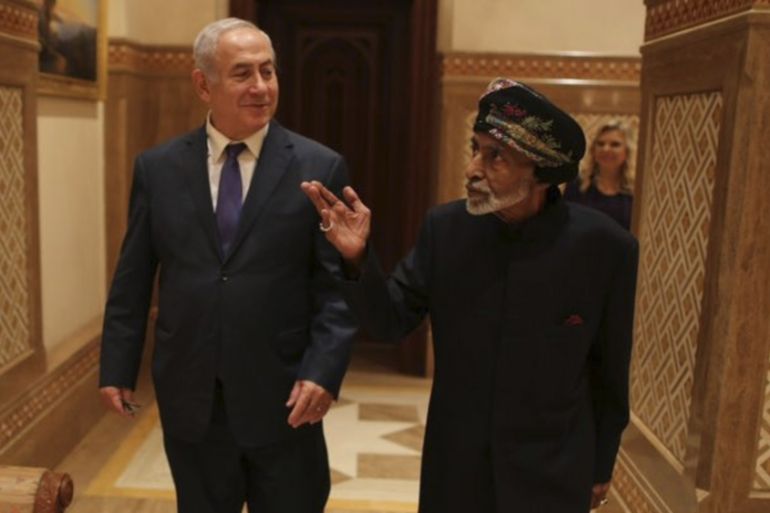Israel’s Netanyahu meets Sultan Qaboos in surprise Oman trip
Visit by Israeli prime minister forms part of policy of ‘deepening’ ties with the states of the region, statement says.

Israeli Prime Minister Benjamin Netanyahu has made an unannounced trip to Oman, according to his office, in an apparent sign of warming ties between the two countries.
Netanyahu and his wife Sara were joined by Mossad intelligence chief Yossi Cohen, who has reportedly been responsible for clandestine talks with Gulf governments, and National Security Adviser Meir Ben-Shabbat.
Keep reading
list of 4 itemsThousands of Israelis protest against government, urging captive deal
Biden presses Netanyahu for steps to protect civilians in Gaza: White House
Why I’m protesting against my Israeli government | Close Up
The Israeli delegation reportedly flew to Oman on Thursday and returned to Israel on Friday.
Marking what was the first visit by an Israeli leader to the sultanate in over two decades, Netanyahu’s office said in a statement on Friday that the visit came at the invitation of Sultan Qaboos and followed “lengthy contacts between the two countries”.
|
|
His office added that it formed part of a policy of “deepening relations with the states of the region”.
A joint statement said the two sides “discussed ways to advance the Middle East peace process” and “a number of issues of mutual interest to achieve peace and stability in the Middle East”.
Oman and Israel do not have diplomatic relations.
The last Israeli leader to visit Oman was Shimon Peres in 1996.
Earlier this week, Palestinian President Mahmoud Abbas also paid a three-day visit to Oman.
Growing relations?
In recent years, Netanyahu has insisted that relations between Israel and Gulf countries have been growing, despite none of the seven Gulf states officially recognising Israel.
“You should not underestimate the openness and the thirst in the Arab world today for Israel,” the Israeli prime minister said on Thursday.
Akiva Eldar, a senior columnist for Al-Monitor, told Al Jazeera that Netanyahu’s visit to Muscat was intended to send a message to Gulf states that the “Saudis were not the only game in town”.
“Following the [Jamal] Khashoggi affair, several countries from the Arab Peace Initiative of 2002 have been allowed to take a small lead of the process. Mahmoud Abbas visited Oman recently and both parties [the Israelis and Palestinians] have now mentioned Oman as a potential facilitator of the peace process.
“Second, Donald Trump talks about the deal of the century, or the ultimate deal, and when he talks about it – he means there will be new partners,” Eldar added, referring to the US president’s long-awaited peace plan.
“And if you look at Netanyahu’s speech at the UN in September, [when] he said [that] thanks to Iran, Arab countries – which had been keeping a distance from Israel – are now getting closer and closer because we have a mutual enemy.”
A Wikileaks cable from 2010 reported that Gulf states believed they could “count on Israel against Iran”.
In the cable, Israeli Foreign Ministry official Yacov Hadas said: “They [the Gulf states] believe Israel can work magic”.
Saudi Arabia and the United Arab Emirates (UAE), like Israel, view Iran as a regional threat and previously lobbied the US to withdraw from a multinational nuclear deal with Tehran.
Mohammed bin Salman, Saudi Arabia’s powerful crown prince, met with several Jewish groups and pro-Israel lobbies during a trip to the US earlier this year and declared that Israel had the right to its own land alongside Palestinians.
Last month, Israel’s Channel 2 reported that Energy Minister Yuval Steinitz returned from a “secret trip” to Abu Dhabi where he discussed “shared concerns” over Iran and other undisclosed matters.
Meanwhile, Israel’s Culture and Sports Minister Miri Regev on Friday arrived in the UAE for the Abu Dhabi Grand Slam Judo tournament in which Israel’s national team is competing.